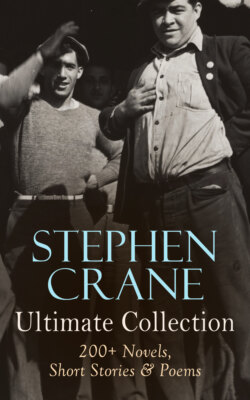Читать книгу Stephen Crane - Ultimate Collection: 200+ Novels, Short Stories & Poems - Stephen Crane - Страница 65
На сайте Литреса книга снята с продажи.
CHAPTER XVII
ОглавлениеTable of Contents
When he entered the chamber of death he was brooding over the recent encounter and devising extravagant revenges upon Blue Billie and the others.
The little old woman was stretched upon her bed. Her face and hands were of the hue of the blankets. Her hair, seemingly of a new and wondrous grayness, hung over her temples in whips and tangles. She was sickeningly motionless, save for her eyes, which rolled and swayed in maniacal glances.
A young doctor had just been administering medicine.
‘There,’ he said, with a great satisfaction, ‘I guess that’ll do her good!’ As he went briskly towards the door he met Kelcey. ‘Oh,’ he said. ‘Son?’
Kelcey had that in his throat which was like fur. When he forced his voice the words came first low and then high, as if they had broken through something.
‘Will she—will she—’
The doctor glanced back at the bed. She was watching them as she would have watched ghouls, and muttering.
‘Can’t tell,’ he said. ‘She’s a wonderful woman! Got more vitality than you and I together! Can’t tell! May—may not! Good-day! Back in two hours.’
In the kitchen Mrs. Calahan was feverishly dusting the furniture, polishing this and that. She arranged everything in decorous rows. She was preparing for the coming of death. She looked at the floor as if she longed to scrub it.
The doctor paused to speak in an undertone to her, glancing at the bed. When he departed she laboured with a renewed speed.
Kelcey approached his mother. From a little distance he called to her: ‘Mother—mother—’ He proceeded with caution lest this mystic being upon the bed should clutch at him. ‘Mother—mother—don’t yeh know me?’ He put forth apprehensive, shaking fingers and touched her hand.
There were two brilliant steel-coloured points upon her eyeballs. She was staring off at something sinister.
Suddenly she turned to her son in a wild babbling appeal:
‘Help me! Help me! Oh, help me! I see them coming.’
Kelcey called to her as to a distant place. ‘Mother! Mother!’ She looked at him, and then there began within her a struggle to reach him with her mind. She fought with some implacable power whose fingers were in her brain. She called to Kelcey in stammering, incoherent cries for help. Then she again looked away.
‘Ah, there they come! There they come! Ah, look—look—loo—’ She arose to a sitting posture without the use of her arms.
Kelcey felt himself being choked. When her voice pealed forth in a scream he saw crimson curtains moving before his eyes.
‘Mother—oh, mother—there’s nothin’—there’s nothin’—’
She was at a kitchen-door with a dishcloth in her hand. Within there had just been a clatter of crockery. Down through the trees of the orchard she could see a man in a field ploughing.
‘Bill—o-o-oh, Bill—have yeh seen Georgie? Is he out there with you? Georgie! Georgie! Come right here this minnet! Right—this—minnet!’
She began to talk to some people in the room:
‘I want t’ know what yeh want here! I want yeh t’ git out! I don’t want yeh here! I don’t feel good t’-day, an’ I don’t want yeh here! I don’t feel good t’-day! I want yeh t’ git out!’ Her voice became peevish. ‘Go away! Go away! Go away!’
Kelcey lay in a chair. His nerveless arms allowed his fingers to sweep the floor. He became so that he could not hear the chatter from the bed, but he was always conscious of the ticking of the little clock out on the kitchen shelf.
When he aroused, the pale-faced but plump young clergyman was before him.
‘My poor lad!’ began this latter.
The little old woman lay still with her eyes closed. On the table at the head of the bed was a glass containing a water-like medicine. The reflected lights made a silver star on its side. The two men sat side by side, waiting. Out in the kitchen Mrs. Calahan had taken a chair by the stove and was waiting.
Kelcey began to stare at the wall-paper. The pattern was clusters of brown roses. He felt them like hideous crabs crawling upon his brain.
Through the doorway he saw the oilcloth covering of the table catching a glimmer from the warm afternoon sun. The window disclosed a fair, soft sky, like blue enamel, and a fringe of chimneys and roofs, resplendent here and there. An endless roar, the eternal trample of the marching city, came mingled with vague cries. At intervals the woman out by the stove moved restlessly and coughed.
Over the transom from the hall-way came two voices.
‘Johnnie!’
‘Wot!’
‘You come right here t’ me! I want yehs t’ go t’ d’ store fer me!’
‘Ah, ma, send Sally!’
‘No, I will not! You come right here!’
‘All right, in a minnet!’
‘Johnnie!’
‘In a minnet, I tell yeh!’
‘Johnnie—’ There was the sound of a heavy tread, and later a boy squealed. Suddenly the clergyman started to his feet. He rushed forward and peered. The little old woman was dead.
